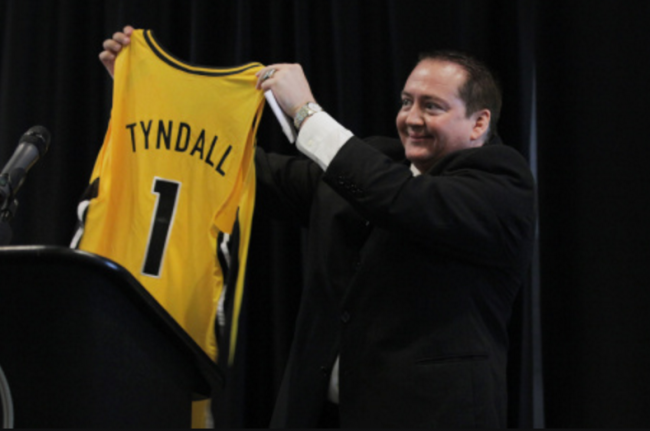You have /5 articles left.
Sign up for a free account or log in.

Donnie Tyndall
U of Southern Mississippi
For two years, the former head men’s basketball coach at the University of Southern Mississippi directed his staff to complete the course work of prospective athletes while they were still enrolled in junior colleges, the National Collegiate Athletic Association said Friday.
Showing how the pressures of Division I college athletics can breed academic fraud far beyond the walls of a single campus, the university’s basketball staff completed more than 100 assignments in online courses for recruits attending two-year institutions. The case comes less than three months after the NCAA concluded that a former assistant football coach at the University of Louisiana at Lafayette made arrangements with the head of a Mississippi testing center to falsify the ACT scores of players and recruits.
“This thing has tentacles,” David Ridpath, a professor of sports administration at Ohio University and an advocate for reforming the academic side of college sports, said. “That’s been proven over and over again. High schools, testing sites, junior colleges -- the corruption trickles down from the universities and affects all levels of education.”
Within six weeks of starting at Southern Mississippi in 2012, the former head coach, Donnie Tyndall, directed two graduate assistants and two assistant coaches to travel to where the prospective athletes were living so they could assist them with their course work. The recruits, all students at two-year institutions, were struggling to earn the necessary academic credentials to transfer to Southern Mississippi and be immediately eligible to compete.
Over the next two years, according to the NCAA, the assistants completed numerous assignments in several online courses for seven athletes.
In one case, a recruit was such a weak student that his coach described him as “as far away from graduating as any kid I’ve ever had.” Yet when he took three online courses through another institution to become eligible at Southern Mississippi, his GPA for those courses was 3.75. According to the NCAA, one of Tyndall’s graduate assistants completed at least 20 math assignments in those courses.
Analysis of the assignment’s metadata showed that one of the assignments was completed by the graduate assistant’s mother. An acquaintance of the assistant who lived in Jamaica also completed several of the assignments. More than 30 psychology assignments were submitted from Jamaica, when the athlete was attending a two-year institution in Florida.
In May 2013, an assistant coach emailed Tyndall and informed him that the recruit was “halfway done with psychology” and was working on completing his English assignments.
“Cool,” the head coach replied. “Don’t say anymore bout that on here!!” [sic]
Tyndall’s involvement in the fraud, according to the NCAA, went farther than the occasional email. In September 2013, Tyndall learned that a recruit needed two English courses and a math course in order to be eligible, but the student could not pay for them. The former head coach went to a pharmacy and purchased four prepaid $500 credit cards. He gave the cards to his graduate assistants, who then used them to pay the registration fees of the online courses.
One of the graduate assistants completed 75 of the athlete’s online English assignments. The recruit later admitted that he did not register, pay for or complete any of the online courses.
“The activity followed a consistent pattern of assistant coaches and graduate assistants completing online course work and submitting it on behalf of the prospects,” the NCAA’s Division I Committee on Infractions concluded. “Based on the totality of the information presented, the panel finds not credible the former head coach’s denials that he directed the members of his staff to complete the online academic course work. The panel finds that he devised and orchestrated the plan.”
Tyndall also facilitated cash and prepaid credit card payments to two players from their former coaches, according to the infractions report. One of the players’ former high school coaches mailed money directly to Tyndall, who would then give the money to the player to help pay university bills. A year later, Tyndall made a similar arrangement with the prep school coach of one of his players.
The former head coach told NCAA investigators that he had discussed the arrangement with the university’s compliance director, though the director said he did not recall the conversation. He also instructed a staff member to fabricate a document that falsely showed the university approved of the payments.
Tyndall left Southern Mississippi in 2014 to coach at the University of Tennessee. That November, Southern Mississippi announced it was under investigation by the NCAA, leading Tennessee to later fire Tyndall after one season because of his involvement in the violations.
In a statement Friday, Tyndall said he will appeal the NCAA's decision and may sue the association. "I absolutely reject that the 'totality of the information' showed that I participated in the academic misconduct," he stated.
The NCAA's sanctions against Tyndall include a 10-year show-cause order that makes him essentially unemployable by an NCAA team until 2026. The sanctions against Southern Mississippi include three years of probation. The association accepted the university’s already self-imposed two-year postseason ban.
"I am very pleased that this matter has reached its conclusion and that we can move forward in a positive manner," Bill McGillis, Southern Mississippi's athletics director, said in a statement. "We respect the committee’s decision and appreciate that they recognized our level of cooperation and the affirmative steps the university took to expedite the final resolution of the case. Maintaining an unwavering commitment to integrity, and a strong culture of rules compliance, is fundamental to our athletics program and a core value that can never be compromised."
In the past two years, several Division I institutions have been investigated by the NCAA for academic fraud, including the University of North Carolina at Chapel Hill, Southern Methodist University, Syracuse University and Weber State University, in addition to Southern Mississippi and the University of Louisiana at Lafayette.
NCAA officials have been hesitant to draw any connections, however.
“We’ve been focused very much on academic fraud over the last year,” Eleanor Myers, a Temple University law professor who chaired the infractions panel that considered the Southern Mississippi case, said Friday. “But it’s hard for me to say if it’s on the rise.”




